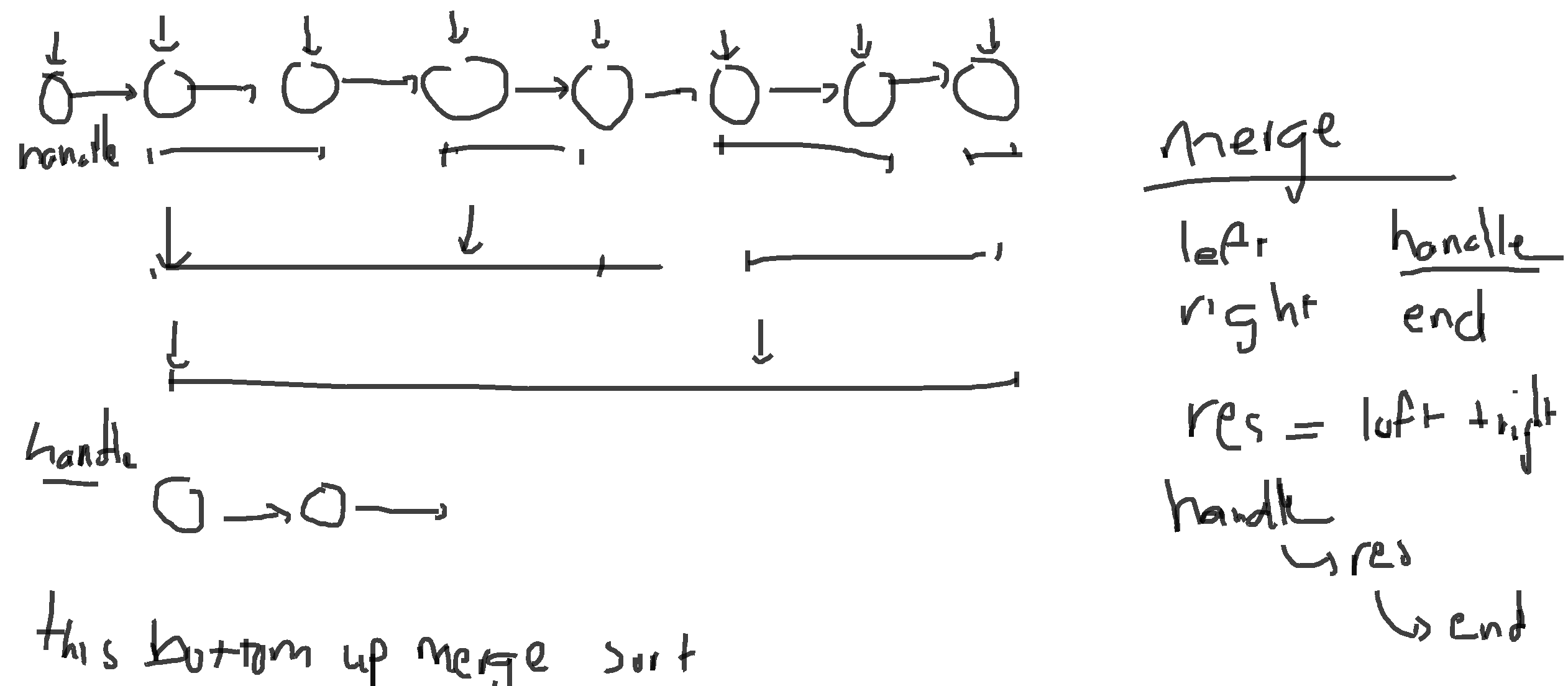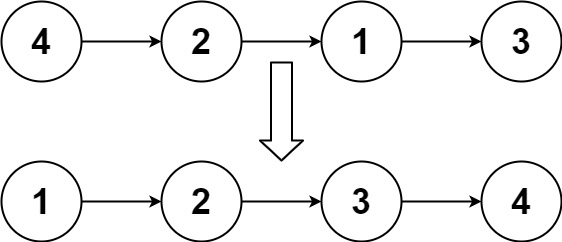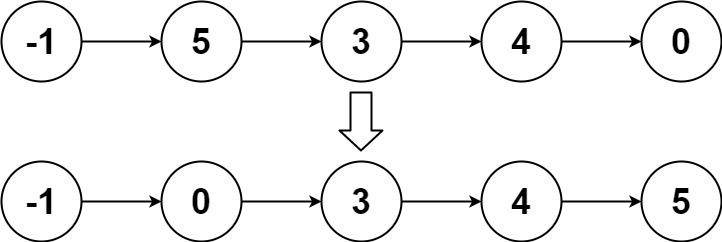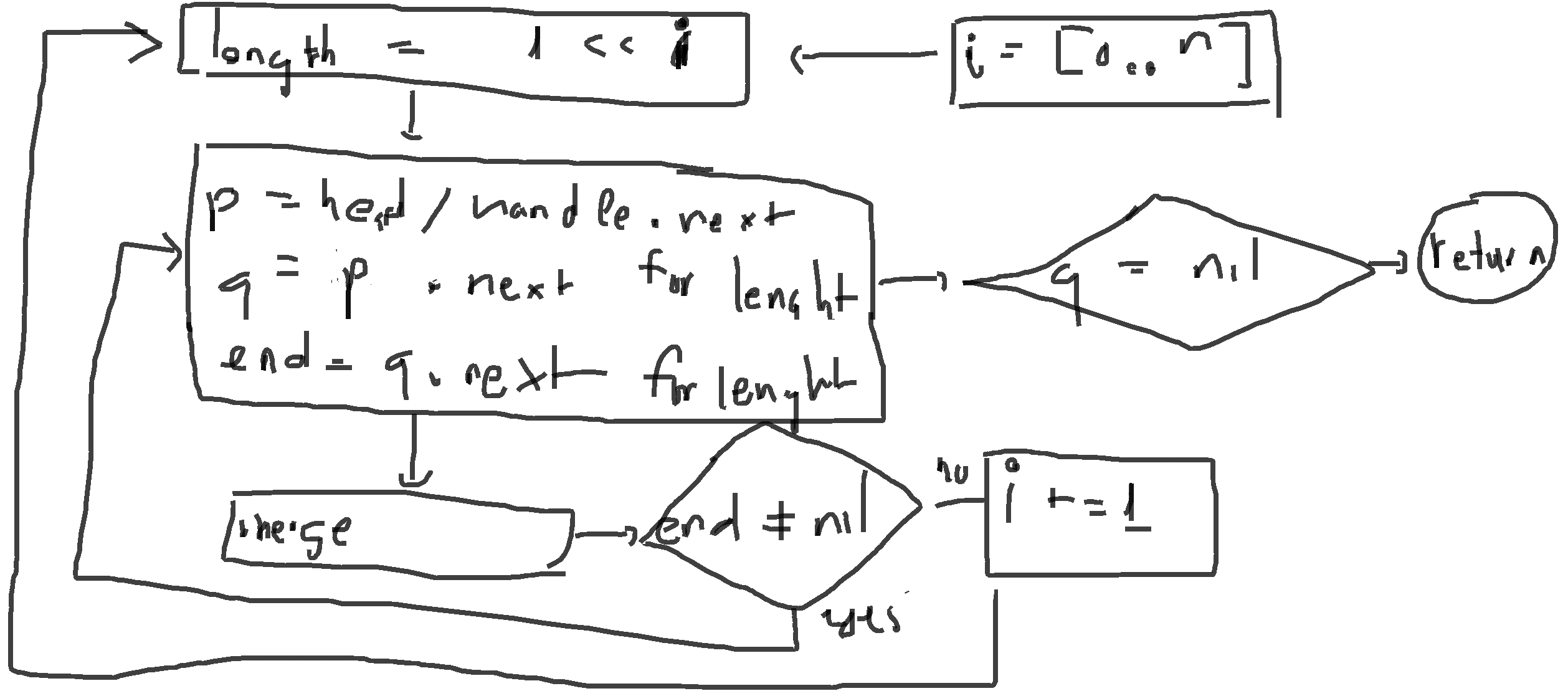148. Sort List
Problem¶
Given the head of a linked list, return the list after sorting it in ascending order.
Example 1:
Input: head = [4,2,1,3]
Output: [1,2,3,4]
Example 2:
Input: head = [-1,5,3,4,0]
Output: [-1,0,3,4,5]
Example 3:
Input: head = []
Output: []
Constraints:
- The number of nodes in the list is in the range
[0, 5 * 104]. -105 <= Node.val <= 105
Follow up: Can you sort the linked list in O(n logn) time and O(1) memory (i.e. constant space)?
Solve¶
Quick thought and white board¶
O(1) memory could mean using in-place sorting this seem not that possible for any O(n log n). Still, I think could try using merge sort here, this make possible as we dealing with linked list, which it self have some ideal way of memory handling.
Quick though on merge sort with bottom up appoarch

Merge sort is quite a complex thing to do a flow chart

Implementation Merge sort bottom up¶
This is hard, a really hard way to do a simple thing, while the result is just too bad in python.
Doing it in
O(1)space
My flow chart is garbage here, but let talk about it:
- First, we want to split the linked list. This can be done using Bottom up or Top down approach, which here I using bottom up:
- This is done by split them into a
length = 2 ** i = 1 << i, orlength in [1, 2, 4, 8, ...] - If this adding up to the length of the inputted linked list, we are done merging
- If the linked list isn’t being traversal all the way yet, this mean we can split it to at least two linked array. So, we have to merge it
- This mean, we trying to merge two linked list length
~ lengthtogether
- This is done by split them into a
- Merge Sort isn’t a big of a deal, but we need at least 4 input:
Start: This is the handle of the Linked list, which isn’t in the merge range (or sorted range) and remain unchanged. This require so that we can keep the linked list flow in right order. We should haveStart = prev_LeftLeft: This is the head of First list, The first list should beLeft -> ... -> prev_RightRight: This is the head of Second list, which should beRight -> ... -> prev_EndEnd: Similar to start, but it out side merge range and at the end.- We done the merge part by:
- Start with
leash = Start,pstart from start of the first linked listLeft,qstart from start of the second linked listRight. - Link it to either
porqbase on their value, minimum have higher piority.- If either reach their corresponded end (
p == Rightorq == End), we push all remainporqinto leash
- If either reach their corresponded end (
- The last
leashis linked toEnd - To help our next merge, we return the
leashwhich is the nextstartpoint of the next merge (if had)
- Start with
- This mean, we have to handle the main loop to extract and call merge sort on all needed for input
(start, left, right, end)- To simplify the problem, I create a temp
handlethat connect toheadof inputted linked list, this mean case whereleft = headcan havestart = handle - We can loop through the linked list once, each time keep track of start, left, right, end:
- If we have
left == head, right == None, end == None, this mean we done merge and the linked list is sorted - If we have
left != head, right == None, end == None, this mean we can skip the merge function and go to next length - If we have
right != None, we try to reach tillend:- We need to merge founded
start, left, right, end - If
end == None, which mean we not have any remain node to merge, so we go to the next length
- We need to merge founded
- If we have
- To simplify the problem, I create a temp
Here, I just please my self if I have some extra way to contain split point, like a array or some thing similar, but oh well.
645ms
Beats 14.82% of users with Python3
# Definition for singly-linked list.
# class ListNode:
# def __init__(self, val=0, next=None):
# self.val = val
# self.next = next
class Solution:
def sortList(self, head: Optional[ListNode]) -> Optional[ListNode]:
def merge(start, left, right, end):
leash = start
p = left
q = right
while True:
if p != right and q != end:
if p.val < q.val:
leash.next = p
leash = leash.next
p = p.next
else:
leash.next = q
leash = leash.next
q = q.next
elif p != right:
leash.next = p
leash = leash.next
p = p.next
elif q != end:
leash.next = q
leash = leash.next
q = q.next
elif p == right and q == end:
break
# print(leash.val)
leash.next = end
return leash
handle = ListNode(0, head)
for i in range(4 * 4 * 4 * 4):
length = 1 << i
start = handle
end = None
while True:
p = start.next
q = p
for _ in range(length):
if q == None:
if p == handle.next:
return handle.next
else:
break
q = q.next
if q == None:
break
end = q
for _ in range(length):
if end == None:
break
end = end.next
prev_end = merge(start, p, q, end)
# print(handle, start.val, p.val, q.val, end == None)
if end != None:
start = prev_end
else:
break
return handle.next
Obvious way is just delinked list and sort the whole thing in one go, but this is fine.
I don’t think this code is unreadable, but it quite hard to implement.
This mean, I should care more about the approach before decide to code the thing. Let see some easier approach, while of course using some thing that rewarded than python.
Top down Merge sort¶
O(n log n)
- Well, top down is even harder, you want to split the list in half. Every single time.
TBH I taking longer to finish this, but overall the code look easier to understand that the bottom up approach
- The main point is that we split it into actual Linked list, rather than keeping it inplace
- This reduce the need ofstartandendvariable
- Now, the merge sort just need to received a single linked list as input. Split it in half, sort each half, then merge it
- For the split, we split them into two real linked list (link end of left and right into
NILor0)- Split could use two pointer to find the middle Node.
- A
prev_pis used to track the end of left linked list, so we can setprev_p -> next = 0to split left into a different linked list.
- Other than that, the main merge flow work the same.
- We still need temp value to hold the
headof new list. Which istemp.nexthere, I use a stack allocatetempvariable so that I not need to free that address after finishing the function. - Return the head
temp.nextof new list so that after merge old head could have been move to other place merge
- We still need temp value to hold the
67ms
Beats 61.63% of users with C
/**
* Definition for singly-linked list.
* struct ListNode {
* int val;
* struct ListNode *next;
* };
*/
typedef struct ListNode Node;
// void printLinkedList(Node* head) {
// Node* p = head;
// while (p != 0) {
// printf("%d ", p->val);
// p = p->next;
// }
// printf("\n");
// }
void split_half (Node* head, Node** left, Node** right) {
if (head == 0) {
*left = 0;
*right = 0;
return;
}
Node *prev_p = 0;
Node *p = head;
Node *q = head;
while (true) {
prev_p = p;
p = p->next;
q = q->next;
if (q == 0)
break;
q = q->next;
if (q == 0)
break;
}
*left = head;
prev_p->next = 0;
*right = p;
}
Node* merge_sort(Node* head) {
if (head == 0 || head->next == 0) {
return head;
}
Node temp;
Node* leash = &temp;
Node* left, *right;
split_half(head, &left, &right);
// if (left != 0) printLinkedList(left);
// if (right != 0) printLinkedList(right);
// printf("\n");
left = merge_sort(left);
right = merge_sort(right);
Node* p = left;
Node* q = right;
while (true) {
if (p != 0 && q != 0) {
if (p->val < q->val) {
leash->next = p;
leash = leash->next;
p = p->next;
} else {
leash->next = q;
leash = leash->next;
q = q->next;
}
} else if (p != 0) {
leash->next = p;
leash = leash->next;
p = p->next;
} else if (q != 0) {
leash->next = q;
leash = leash->next;
q = q->next;
} else if (p == 0 && q == 0) {
break;
}
}
// printLinkedList(temp.next);
return temp.next;
}
struct ListNode* sortList(struct ListNode* head){
Node* prev, *left, *right, *start, *end;
Node* p = head;
head = merge_sort(head);
return head;
}
Rust ?¶
We not even have a mutable value, which mean, we can’t change the input
impl Solution {
pub fn sort_list(head: Option<Box<ListNode>>) -> Option<Box<ListNode>> {
match &mut head {
Some(node) => {
node.val = 5;
return head;
}
None => {
return head;
}
}
}
}
Thus require us, to modify provided function into a mutable one
impl Solution {
pub fn sort_list(mut head: Option<Box<ListNode>>) -> Option<Box<ListNode>> {
match &mut head {
Some(node) => {
node.val = 5;
return head;
}
None => {
return head;
}
}
}
}
Now this is some what workable, but overall, isn’t even ideal for this type of question. Hmmmmmmmmm ? Guess I never know.
Created : September 17, 2023


